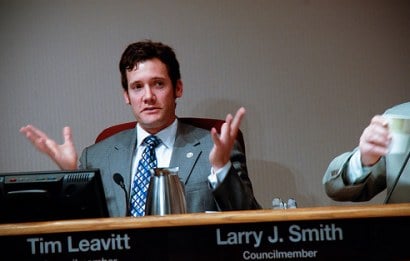
(Photo © J. Maus)
[Note from publisher: After commenters brought it to my attention, I realized my initial headline for this story “Leavitt flip-flops…says he’d be OK with CRC tolls” was not an accurate characterization of the situation. I’ve edited the headline and the story to better reflect Leavitt’s position. — Jonathan Maus]
Vancouver Mayor Tim Leavitt, who based his successful campaign against incumbent Royce Pollard on being vociferously opposed to tolling the new I-5 bridge, has now laid out a tolling plan.
Here’s a snip from an editorial published in The Columbian this morning:
The apparent evolution of Vancouver Mayor-elect Tim Leavitt’s bridge toll policy has all the earmarks of political expediency.
On July 13, Leavitt told the local council of the League of United Latin American Citizens, shortly before winning its endorsement: “No tolls, absolutely not. Tolls simply have too much of an impact.”
Two days later, when pressed repeatedly for an answer at a meeting with The Columbian’s editorial board, Leavitt said he would accept tolls as a last resort for funding a new Interstate 5 Bridge…
On Friday, less than a month after winning the mayoral election with a vigorous anti-toll campaigning strategy, Leavitt presented a tolling plan…
Everyone has understood for a long time that tolls were imperative for the Columbia River Crossing (CRC) project to happen. Former Mayor Royce Pollard supported them and Leavitt made it clear in his election campaign that he did not. This difference of opinion made the CRC toll issue a pivotal component of the recent campaign.
Ironically, many people opposed to the CRC project were happy with Leavitt’s strong anti-toll stance because they understood it would make progress on the project even tougher than it already is. Even with Leavitt’s new tolling plan, the project is far from regaining the momentum it needs.
Leavitt is on the CRC’s Project Sponsor’s Council which meets Friday in downtown Portland.



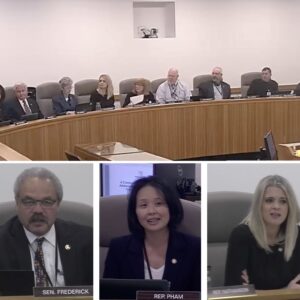
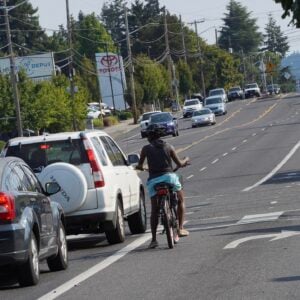
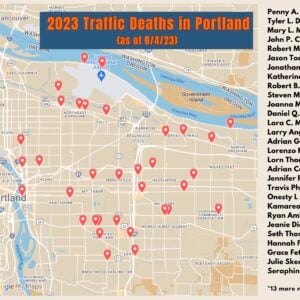
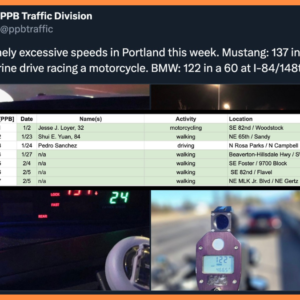
Thanks for reading.
BikePortland has served this community with independent community journalism since 2005. We rely on subscriptions from readers like you to survive. Your financial support is vital in keeping this valuable resource alive and well.
Please subscribe today to strengthen and expand our work.
That’s too bad. I’d be all for Leavitt being consistent and blocking tolls – which would kill the CRC crossing completely.
Maybe he had an open discussion with someone about what congestion pricing is and why it would benefit everyone, including the people you price out of the peak time commute.
No matter what kind of bridge you want, congestion pricing is still the right answer.
As a business owner in Beaverton, I’m all for congestion pricing in Portland. It will drive consumers out of Portland and out to the burbs.
“Wow. We fully expected that Leavitt would have to find a way to wiggle out of his anti-toll rhetoric, but it’s still shocking to read about it.”
Really? You’ve never seen a politician lie to get elected?
JE wrote:
yeah. I have. but this was just so obvious and so blatant. and he didn’t even fight for his rhetoric for very long.. the election just ended a few weeks ago! he didn’t even put up a valiant fight for what he “believed” in.
Anonymous.
Really? You think that if we started tolling the tunnel, motorists would stop coming to Portland and instead would opt to eat at the Beaverton Applebees and shop at the Beverton Targhetto, er Beaverton Target?
I’d love to have tolls on the I5 and I405 and the tunnel to Beaverton. I say let all of the toll monies go to build MAX lines, Light Rail, Bike and Ped infrastructure, and make the Trimet buses free.
Then, instead of driving into Portland, you might just move here.
Maus, you’re picking and choosing from the facts to create your own story. The section you chose to highlight isn’t from a recent article (which would indicate a flip-flop), but from this summer. Leavitt has been consistent.Unfortunately, so have weak reporting and selective listening.
I live in the Couv and have been watching this whole thing very closely, and listening to the actual statements not just the parts I want to hear. Personally, I hope the whole thing fails because it’s already a financial sinkhole and a clusterf*ck of bad work by committee.
But if it does get built? Yeah, I supported Leavitt because he’s against tolling. And what he’s against isn’t just the *idea* of tolling, but specifically the injustice of people who have to commute to oregon for jobs that don’t exist up here, and who already pay 10% into oregon’s failing tax coffers, having to pay yet again for the privilege of trying to make a living.
That’s what he’s been saying for months now, and it’s what he’s saying now.
SW WA has gotten screwed coming and going, by both Portland and Olympia, for decades now. I’m glad to finally see someone who represents me willing to say, ‘no. let’s try something different.’
vantucky holler,
I hear you and I acknowledge that I have not followed Leavitt’s CRC position very closely.
however, I know these facts:
— He campaigned to much applause by saying he was “against tolling”.
— The issue of tolling the CRC was an important one in his fight against Pollard.
— Now that he’s elected he has said he is not fully against tolls.
I tried to only report those basic facts, without getting into unknown territory. If i failed to do that I regret it. Thanks for your feedback and comment.
Vancouverites are suckers! I love how the giant billboard on the West side of the bridge still proudly announces his candidacy. I can’t remember if it mentions tolling. That would be super-ironic. I think he was a single issue candidate (at least among the uninformed voters) and on that issue he has already failed.
Vantucky Holler: you should become a politician; you have mastered the use of weasel words.
So according to your own article he was for the tolls back on July 15th, when pressed for an answer.
Way before the election!
This is old news. Months old.
AaronF, Vantucky Holler, and others.
I apologize for not getting this story right and for the inaccurate tone I took with it. After reading your comments and looking more into the story, I realized major edits were needed. I’ve changed the headline and the story to better reflect the news.
thanks. lesson learned.
Leavitt’s been hedging like this for months. Pollard, otoh, has pushed for the fattest project possible all the way through. With Leavitt, if he pushes as hard to fatten the project as Pollard did, at least he isn’t carrying the experience to push it through that Pollard has.
It’s not ideal. But it’s less bad.
vh#7, i think you’ve voiced many of the opinions of folks here in vancouver. evidently the majority since we have a new mayor.
both royce and tim were at a neighborhood association meeting i attended and i was impressed with tim’s candor and thoughts on leadership and the role of local government. the fact that he did not lower himself to personal attacks like royce did in their discussion and during the campaign was quite refreshing. tim clearly voiced his opposition to tolling and his reasons but also stated that it was an option he was not willing to take off the table. things like police, fire, road maintainence and school funding in our current economy were major issues in his campaign. supporting public transportation, investing in our port, revitalizing the downtown core and supporting the arts were also issues he adressed and is keen on. he came (without an invitation) to a bikeme! vancouver meeting. granted he didn’t speak and rather came in and stood in the back and listened but i for one am glad to see that he’s aware of what’s going on and took the initiative to show up and listen for awhile. i personally thanked him just for stopping by.
i’m also glad to see someone who wants to represent my interests and would work to build relationships and partners in the region instead of a mayor who had repeatedly told local governments he doesn’t like how they do business. alienating potential allies just doesn’t make any sense to me. yes it’s time to try something different.
The real toll debate is between “temporary tolls” to pay for the bridge construction as have been used historically for bridges between the two states and permanent tolls to manage demand and pay for all manner of transportation options a la the Golden Gate Bridge in the Bay Area.
There is no way to finance anything without tolls; we paid $.20 one way back in the early ’60s to pay for the second bridge. One should expect that a zero will be added and tolls will be in the $4-5 range/two way. The great irony is if tolls were put on today, the problems would largely go away due to reduced demand and more efficient use of the resource.
To follow up on Lenny…And our great grand/ and great great grandparents paid much higher tolls in 1917 as a proportion of income (and given inflation) than the second toll in the 1950s or the proposed range of tolls being discussed. [This too seems to always be lost in the discussion along with the recent item in Monday’s Bikeportland news that car drivers only cover about half of the cost of driving through direct user fees.]
So, because Vancouverites pay Oregon State income taxes, they feel they should not have to pay tolls? That’s the argument?? Really??? Because I just want to be sure I got it right. The users of a bridge don’t want to pay a user fee for the bridge because it should come out of general state funds. The same funds I pay my taxes into, even though I don’t drive across that bridge. And I’m sure that they get no other benefit from those taxes, like maybe the reason the jobs are here in the first place.
Sheesh,our state legislatures are so spineless that someone could bait a hook with ’em–otherwise they’d be talking about the simultaneous tripling or quadrupling of both states’ gasoline taxes to fix roads and rebuild bridges.
One time or another, everyone from Klamath Falls to Blaine uses that bridge
so why target the people who live closest to it? What’s it going to take–the Sellwood and Interstate bridge both falling into their respective rivers on the same day?
Just keep in mind that the heart of the problem on I-5 across the Columbia is too many commuters alone in their cars during the peak commute hours. Otherwise the bridges are fine for years more with the usual seismic upgrades, etc.
pee jay #16, your argument for vancouver residents for not wanting tolling is the knee jerk, simple reaction of many folks here and evidently in portland as well seem to gravitate towards.
i think it’s much more complex than that but it’s certainly a component. the main idea i’ve heard voiced against tolling is that it would have a greater adverse impact on those who can least afford the costs. the working class, lower income and fixed income people. with the recent greatest robbery in the history of the u.s. we have seen the near elimination of the middle class. things like a state line do not separate it’s effects, we (as in you and me and everyone else) are impacted and will share the financial burden. the costs of tolling will be reflected in the rise in price of goods and services across the board for the entire region (i’m talking about the impact on commercial transportation). prices for building materials, food, clothing, fuel (not just gas for cars but also heating oil too) and even tires for your bike will go up. everyday staples like bread and milk, whether it’s gluten free, soy or not will be cost more in the region. with tolling everybody shares the cost regardless if you drive or not and those that can least afford it will be hurt the most. i aplogize if i’ve offended any vegans out there i just wanted to show that the effects of tolling isn’t as simple as an “us” and “them” issue, it’s a “we” issue.
many portlanders rail against vancouver as having some sense of entitlement for living here and that we should move to portland to be more environmentally consious and closer to our places of employment. would you ask the same of beaverton, gresham, salem, or sandy residents that do not have the diversity and pay scale of jobs near them to move into portland? many people have spent substantial financial and social investment in the outlying communities in which they live and as a stakehholder are reluctant to relocate. many people because of finances do not have the option of relocating.
i do appreciate your suggestion of suppy/demand pricing for the costs of services in your #16 comment in the recent crc article. a very valid idea but one that i think most people would have a hard time wraping their head around (jane and john q public). how about no toll in off-peak hours? personally i lean towards socialism and if the socialist party in the u.s. had any political clout i’d vote that way but alas they do not. tolling for bicycles has never been considered an option and in fact the question was brought up to crc planning engineers that made a presentation and asked for input at a bikeme! vancouver meeting this summer. one idea also brought up was if the crc planners had considered access or a lane for lower speed vehicles(like electric or gas scooters) that cannot drive on the freeway but are not allowed on ped/bike paths. the use of these vehicles will only increase and although i don’t plan on ever doing the scooter thing they seem to be a more responsible choice of vehicle transport from both an environmental and financial viewpoint.
perhaps another though admittedly lesser reason folks here in vancouver are opposed to tolling is that the majority of the costs for design, planing, environmental impact studies ect. has been paid for by us. i believe it is around $80 million+ at this point. if someone has a more firm figure on this or if i’m just plain mistaken i’d like to know.
@ gregg #6 –
Once again, spot on! Couldn’t have said it better myself.
Toll all the roads into Portland.
Exactly why funding projects through higher gas taxes is the best idea–bridges like the Interstate are regional facilities, not conveniences built specifically for the use of Vancouver or Portland residents, and widely-spread regional funding is the best way to finance them.
I don’t drive regularly, but I might actually drive more often if there was congestion pricing. I hate being stuck in traffic, but if I could pay to drive to certain places I need to be, save time, and avoid traffic, then the dollars would be worth it. Building our road network to meet the demand of a couple hours per day is unaffordable and wasteful. We need to better use our resources and in the process, we’ll improve mobility for those that NEED it, not necessarily those that WANT it and don’t need it.
Oh, just a reminder, living in Vancouver is a CHOICE.. It’s an expensive choice since it requires so much commuting. I don’t want to subsidize a choice like that, because all I get are negative externalities like more congestion on Portland roads, worse air quality, and dangerous roadways from drivers speeding to reduce their already long commutes. No thanks!